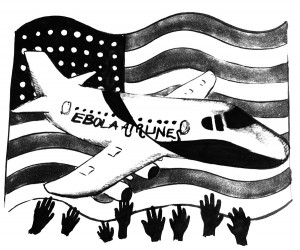Ebola epidemic urgently needs more attention
On Aug. 20, a Liberian soldier shot 15-year-old Shakie Kamara in the leg during a protest of Ebola quarantine regulations in the West Point neighborhood of Monrovia, Liberia. According to NPR, Kamara was later pronounced dead.
The protests in West Point and resulting death of Kamara provide an uneasy resemblance to the current top news story in the United States — police injustice in the death of Michael Brown. Yet while the coverage of the Ferguson, Missouri protests has dominated every major American news outlet, the story of Kamara and the most recent Ebola outbreak has slipped out of media interest, presumably because it is being considered secondary news.
The Ebola virus is a highly contagious disease that needs to regain the spotlight in America and the rest of the world, given its central presence in West Africa. Though there is no simple answer to halting the spread of this pandemic, increasing global awareness of the disease and its symptoms is a necessary first step.
It is imperative that America start the conversation about Ebola awareness and prevention in the global community not only by promoting greater news coverage, but also by providing assistance to the countries in West Africa that have been left in the dark about this disease. This would hopefully lead to further medical and humanitarian strides to containing one of the largest outbreaks of Ebola noted in history. To put it in perspective, The New York Times reports that of the four million people in Liberia, fewer than 250 are doctors. This number does not account for the millions of West Africans living in the other two countries that are at the epicenter of the outbreak, Sierra Leone and Guinea.
More aid workers need to spread awareness of safety precautions that should be taken to combat the growth of the disease in individual communities. These aides should cooperate with local officials to isolate only the individuals infected with the disease — not entire communities like the West Point neighborhood. According to CNN, many civilians in Sierra Leone, Guinea and Liberia are afraid to report infected loved ones due to fear of social stigmatization, regardless of whether their community is quarantined. Mortality rates for the disease range from 50 to 90 percent, causing many civilians to view the survival of their loved ones as nearly impossible.
It is difficult not to sympathize with the hardships that these families face when their loved ones are infected. More civilians should be aware that chances of survival are greater when humanitarian authorities are contacted early. This awareness might promote a collective desire to heal as many people as possible. By informing these communities of the necessity of quarantine restrictions, it would then be possible for the World Health Organization to estimate the extremity of the disease more accurately with the inclusion of unreported cases. A more accurate total might also lead to a greater global concern and the dispatch of more first-world medical aides.
America’s role in containing the recent outbreak has been questionable, to say the least. Recently, Nancy Writebol and Dr. Kent Brantly, two American aid workers from the Christian humanitarian groups Serving in Mission and Samaritan’s Purse, respectively, garnered headlines in the American media after they contracted the disease during their efforts in West Africa. Both Writebol and Brantly were immediately quarantined at Emory University Hospital and treated by a group of physicians with an experimental drug by the name of ZMapp. Sadly, however, the thousands of West Africans who are most in need have no access to the drug.
Mapp Biopharmaceutical of San Diego, the company that produces ZMapp, has reported that it has run out of the drug’s supply and that the drug needs to undergo further human trials to be deemed safe for public use, according to the Huffington Post. Administering the drug in trials to patients infected with a rapidly acting, and oftentimes fatal, virus seems like a built-in opportunity to conduct the trial. This seems like a viable option for thousands who are being quarantined against their will and have no other options aside from scarce medical care.
The nature of this situation, in which an experimental drug is unveiled when Americans contract the disease and later becomes unavailable after they are cured, is unsettling and paints a picture of a selfish America. Of course, the United States should have utmost concern for its citizens, but there must be an urgency to help these other disease-stricken countries as well. Increased American coverage and aid will halt the spread of Ebola and consequentially lead to medical and social progression for the communities in West Africa.


